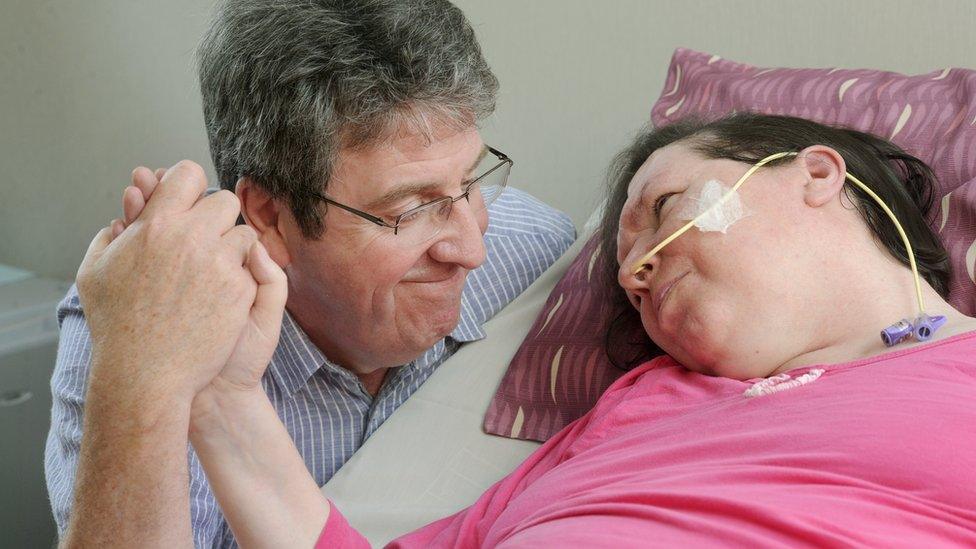Neurological patients put in care homes for the elderly
- Published
- comments

Pamela Mackenzie attends to a patient at the Dee View Court centre in Aberdeen
Many people with conditions such as multiple sclerosis and motor neurone disease are living in care homes for the elderly, a charity has found.
Sue Ryder Care said people with neurological conditions were being let down and needed specialist care.
The charity surveyed Scotland's councils and found 86% of people with neurological conditions in residential care were in homes for the elderly.
It said one in five of these people were under the age of 65.

Here is your wife back, she's broken

Thomas McGreevy's wife Dee has a neurological condition after an operation to remove a tumour. She is still only 58 but has been in an older people's nursing home for more than two years.
Thomas, from Bothwell in South Lanarkshire, says his wife's life is now a "mere existence".
He says Dee is in a room 24 hours a day, staring at four walls.
Thomas says she has received no specialist care since just after her operation more than two years ago.

Freedom of information

The charity said there was a need for more specialist centres for people with neurological conditions
Sue Ryder Care said that without specialist services designed to limit the impact of conditions such as Parkinson's disease, multiple sclerosis, motor neurone disease, Huntington's disease and sudden brain injury people would suffer needlessly and be unable to live their lives as fully as possible.
It sent freedom of information requests to all 32 Scottish local authorities but only 11 were able to answer the question partially or fully.
Sensory impairment
Of those that provided data, there were 380 people with a neurological condition in a care home for older people, with 74 (19%) under the age of 65.
There were 62 people with a neurological condition in a care home for people with physical and sensory impairment, of which 55 (89%) were under the age of 65.
The charity said that if the data was extrapolated for the Scotland population as a whole, it would mean an estimated 1,036 people with a neurological condition in a care home for older people, with 202 of these being aged under 65.
They have produced a report on the progress made to improve specialist care, external for people with neurological conditions in Scotland. The report makes five recommendations, including an audit of health and social care services for those affected.

Recommendations made in Sue Ryder Care Report
Reliable data needed on the prevalence of neurological conditions and whether patients are at home or in care so that care services can be developed
Identify what arrangements work well, what should work better and where the gaps lie
Guidance on neurological services should be provided to ensure local services are person-centred and meet need
Support and advice for general care providers - such as older people's care homes, homecare and community rehabilitation teams
The new standards being developed for neurological conditions must include health and social care services with performance indicators to demonstrate effectiveness

Pamela Mackenzie, director of neurological services and Scotland for Sue Ryder, said: "It is shocking that people who have these complex conditions are being cared for in general nursing homes.
"It is not the fault of the nursing home, however, they are just not geared up to the complexities of these conditions.
"It does mean that they are not getting the level of care and support that they deserve and need to manage their life and their conditions on a daily basis."
Ms Mackenzie added: "We would like the Scottish government to take the lead in developing a strategy for neurological care so there is a consistent approach across Scotland.
"The Scottish government have acknowledged that this is an issue. They are looking at the data on neurological conditions because currently that is not known.
"In order to plan services, you need to understand how many people have a neurological condition."
'Best possible support'
In response to a question from Labour MSP Monica Lennon during First Minister's Questions at Holyrood, Nicola Sturgeon said the Scottish government was developing a national action plan based on the work of Sue Ryder Care.
She said: "The Scottish government works very closely with them and took action based on the priorities that they identified last year, which was making progress on data and clinical standards.
"This report has made five recommendations and we will be taking forward work on all of them.
"I think perhaps most appropriately today, it is to mention that we have already started the development of Scotland's first action plan on neurological conditions and the public health minister has made clear that she wants to see new standards of care developed for people with neurological conditions as part of that work."
The Scottish government has announced plans to extend free personal care to all those under the age of 65 assessed as needing it, including those with neurological conditions receiving care in their own home.
- Published14 September 2017
